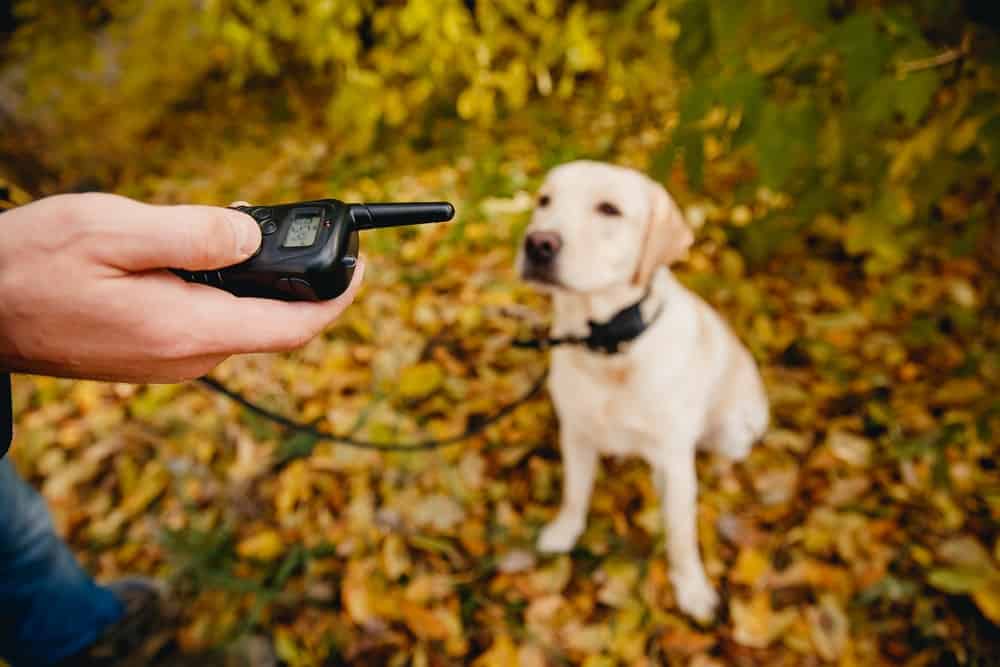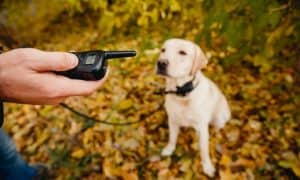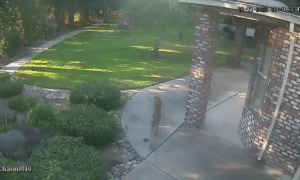“This post contains affiliate links, and I will be compensated if you make a purchase after clicking on my links.”
The Scottish Government has confirmed its decision to ban electric shock collars, saying that “painful or unpleasant training for dogs will not be tolerated.”

They go by many names: e-collar, shock collar, electronic collar, vibration collar, static collar, even “collar mounted electronic training aid.” Now, despite a November announcement that the controversial training devices would continue to be allowed, the collars (which have already been banned in Wales since 2010) will be banned in Scotland with supporters hoping for an eventual blanket ban across the entire United Kingdom.
Based on the idea of operant conditioning, shock collars allow a dog’s handler, owner or trainer to remotely (or automatically, in the case of bark activated or perimeter activated collars) give a “correction” when the dog doesn’t behave in the way that is expected of them.
A recent study, conducted by animal behavior specialists at the University of Lincoln, UK, revealed that training dogs with the use of an e-collar, or shock collar, is a risk to the dogs’ behavioral well-being, especially when compared to reward-based training methods.
While announcing the ban, Scotland’s Environment Secretary Roseanna Cunningham said, “I want there to be no doubt that painful or unpleasant training for dogs will not be tolerated,” and that “anyone found causing pain to dogs through the use of collars or other devices can be prosecuted as they deserve.”
Caroline Kisko, secretary of the Kennel Club, has said that use of shock collars were ‘barbaric’. “In this day and age it is absurd that people are able to give their dog an electric shock in a misguided bid to train them – it is a cruel and lazy method,” she asserted.
Secretary Cunningham said she made the decision, in part, over the ready availability on the internet of cheap devices which can be bought and used by anyone to deliver painful electric shocks.
The ban will be finalized under the Animal Health and Welfare (Scotland) Act 2006 in the coming months. Already written draft guidance says that “causing unnecessary suffering is an offense under the Animal Health and Welfare (Scotland) Act 2006. This includes suffering caused by inappropriate training methods.”
What’s your opinion? Would you support a similar ban in your own country or state?
Should e-collars be outlawed entirely? What about electronic/invisible fencing?
Currently, anyone can walk into a store or go online, purchase an e-collar, strap it to their dog without ever reading an instruction or undergoing any training, and begin using it on their dog.
Should e-collars be available to the general public, or should they only be purchased an operated by someone that has been certified and understands precisely how/when to administer the “shock?”
Weigh in with a comment below!
We know this is a passionate subject for many – please be respectful to those whose opinions may differ from your own.
























Proper use of shock collar not gonna harm your puppy .So you need to use it proper ways and must follow instruction from box .
Max
says:I grew up on a farm with dogs and sheep. none of our dogs were herders and none killed sheep. we did have sheep killed by stray and neighbors’ dogs. it is absolutely possible to train dogs without resorting to ecollars (changing the name changes nothing). Stop letting the dogs run loose.
Rita
says:It is absolutely possible to train dogs without resorting to ecollars, just rarely to the same level of reliability, which is why your last sentence is “stop letting the dog run loose”. Of course a confined dog will not chase sheep, but if you substitute proofing with management, you’ll be left with nothing to ensure safety if this management – lead, fence etc. – breaks down. As for the name change, funny how, without noticing the contradiction, on one hand it’s claimed to be a cover-up, and on the other that it “changes nothing”, especially as neither are true. It’s not a cover-up, because, as you just proved, people still know exactly what the word means, and it’s not meaningless either, because it is to distinguish modern collars from the old, harsh ones.
Miriam
says:Shock collars shouldn’t have ever been created in the first place. I’m pro total ban.
Rita
says:Miriam, the fact that they were should tell you something, and they’re nothing like when they were first created. But of course ban lobbyists have no idea. The ignorance about these collars in this country is staggering and I find it extremely worrying that, at least when it comes to dogs, the ones with decisive power are never the ones with knowledge or even sense. Just look at the breed specific legislation of the Dangerous Dogs Act, same logic, banning of a breed instead of going after those who abuse it. Misuse of a tool is not an argument against its proper use, except in politics, as it looks.
Max
says:I have never used shock collars & believe they would undermine the trust between dog & human.
Rita
says:Max, your comment is a perfect example what’s wrong with this ban. It’s based on the beliefs of those who never used one instead of knowledge of those who do. Appropriately used ecollars (the information of those who call them all shock collars is more than a decade out of date) strengthen dogs’ trust in us and save their lives or at least hugely improve the quality of it safely and humanely in cases of unwanted behaviours that do not respond to external rewards (reward-based training) because they’re self rewarding, as it has been scientifically proven by the latest DEFRA study on electric collars. In Wales, since the ban, dog attacks on sheep become an “everyday occurrence”, as the police said, and now Scotland is to follow. Are you sure that the increase of death or at least enormous suffering of dogs and livestock is good news?